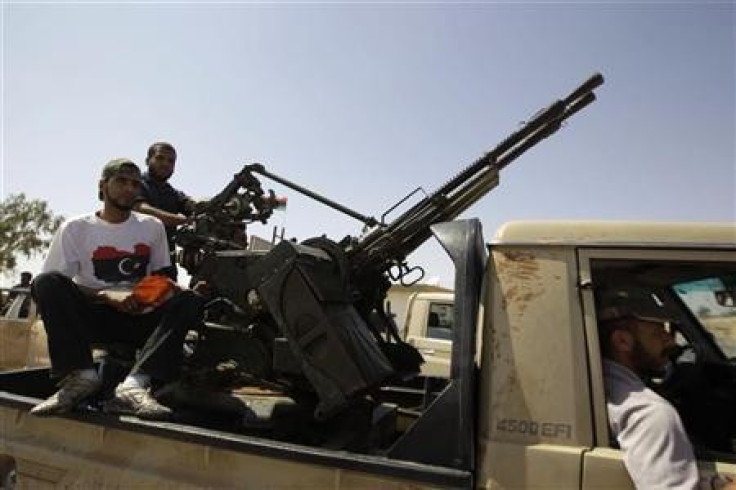UK “Allowing Gaddafi to Stay”, "Will Not End Libyan Conflict"

William Hague, the UK foreign secretary, has said that although the Libyan dictator Muammar Gaddafi must hand over power, he may not have to leave the country.
Reports that Britain is now ready to change its strategy amid a stalemate in the conflict follow weeks of rumours Gaddafi is preparing to leave.
At the beginning of the month, French Foreign Affairs Minister Alain Juppe hinted that the Gaddafi regime was on the brink of collapse. The allegations were endorsed by other E.U officials, but despite claiming for months that the rebel uprising and the Nato-led operation were slowly ousting the Libyan Leader, no tangible signs of him stepping down have appeared.
Mr Hague, speaking on Monday evening in London alongside Alain Juppé, the French foreign minister, said that whether or not Colonel Gaddafi stayed in Libya was "ultimately a question for the Libyans".
"It is for the Libyan people to determine their own future. Whatever happens, Gaddafi must leave power," Mr Hague said.
Mr Hague and Mr Juppé thus took Hillary Clinton's position as she last week was the first one to point out that the final call should be left for the Libyan people to decide.
The UK government, like the rest of the coalition forces seems adamant to change its strategy as five months into its implementation; the Nato-led mission has yet failed to give the rebels any real momentum.
British army chiefs have warned that the nation's armed forces, already stretched by simultaneous deployments in Afghanistan, would be severely challenged if the Libyan operations continue longer than six months.
Mr Juppé this month confirmed the existence of "unofficial contacts" between the Libyan regime and members of the Nato-led coalition, claims which were formally denied by the Libyan government. Under discussion was the idea that Col Gaddafi could be allowed to remain in the country on the understanding that he stepped down, according to people familiar with the negotiations. Reports from the Libyan camp however ridicule the allegations.
Mr Hague appeared to endorse this possibility, suggesting that while the leader's departure from Libya "would be the best way of showing the Libyan people they no longer have to live in fear of Gaddafi," this was for the local people, and not the coalition forces, to decide.
However, the foreign secretary would not comment on the implications for the International Criminal Court - which has issued an arrest warrant for Col Gaddafi - if the Libyan leader was to remain in his home country.
Mr Juppé meanwhile professed the UK and France to be in "perfect co-operation" over Libya, and said they were working along "exactly the same lines".
"We think that we must continue to exert strong pressure on the Libyan regime with the same methods," the French foreign minister said. "If we had not intervened four months ago, it would have been a massacre in Benghazi and I think we may be proud to have taken this courageous decision."
Reiterating Mr Hague's point, Mr Juppé added that Col Gaddafi would have to abandon "all military and civil responsibility", and then it would be "for the Libyan people themselves to decide what [his] fate will be either inside Libya or outside Libya".
A U.N. fact-finding mission has reported that the part of Libya still under Muammar Gaddafi's control has been hit by shortages of food, cash and fuel, but the same can be said about the rebels.
The United Nations issued a statement saying its week-long mission to Libya also identified rising food prices and a strained medical system as some of the challenges facing the government.
The problem however is that rising food prices and shortage of fuel do not only affect the government but first and foremost the Libyan people. The five-month long conflict is directly affecting the civilians and only further destabilise the economy. The consequences of the conflict will certainly be felt for months after its end.
A rebellion that erupted against Gaddafi's rule in mid-February has descended into a civil war, with roughly half the country now outside government hands. However despite the conflict now being called a civil war, few footages of mass anti-Gaddafi demonstrations have reached social network sites such as Facebook or Youtube. Pro-Gaddafi demonstrations on the other hand have been largely promoted, due to the Libyan government's willingness to let the world know it still has supporters.
Despite the Transitional National Council's claims it is the sole representative of the Libyan people, Gaddafi still has his supporters which show how divided the population is. Many insist people in Tripoli are still so frightened of Gaddafi, they prefer to support him. Completely negating the fact that the regime still enjoys a degree of support however will not help reconstruct Libya any quicker.
Whether the UK and France "allowing" Gaddafi to stay in Libya change anything to the situation remains to be seen and for now, the Gaddafi charade of will he or won't he go still continues.
© Copyright IBTimes 2024. All rights reserved.





